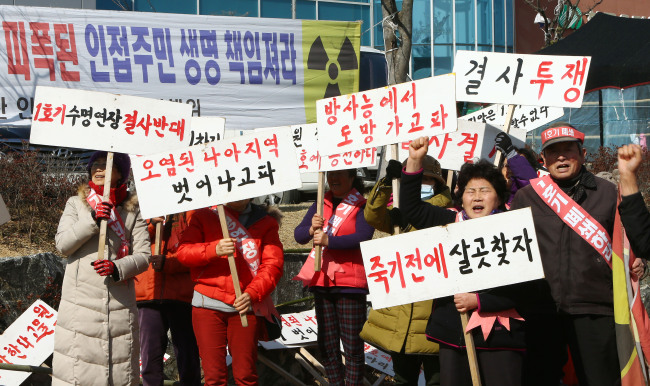South Korea’s decision to extend the life of its second-oldest nuclear power plant until 2020 has triggered controversy, with residents and civic groups expressing concerns over its safety.
The Nuclear Safety and Security Commission, the country’s nuclear watchdog, said Friday that seven of its nine commissioners had voted to restart the 678-megawatt Wolsong unit 1 reactor in Gyeongju, North Gyeongsang Province.
The heavy water reactor shut down in 2012 after reaching the end of its 30-year lifespan.
The state-run Korea Hydro and Nuclear Power, which operates the reactor, welcomed the approval, and announced its plan to restart operations in April.

Residents of Gyeongju, North Gyeongsang Province, where the Wolsong unit 1 reactor is located, stage a protest against the Nuclear Safety and Security Commission’s decision to extend the life span of the reactor on Friday. (Yonhap)
“The Wolsong unit 1 reactor has gone through a thorough safety inspection over the past five years,” Cho Seok, chief executive of the KHNP, said during a press conference at the company’s headquarters on Friday.
The operator, part of the state-run Korea Electric Power Corp., has been seeking to restart Wolsong unit 1, and runs 23 reactors, producing about a third of South Korea’s power.
Cho said that the company would examine the facility’s resistance to unexpected natural disasters and other potential accidents, adding that it would step up efforts to communicate with residents in the region.
Despite the reactor’s economic feasibility, frequent glitches have triggered safety concerns.
Over the 30 years since the reactor started operating in 1983, the nuclear plant was suspended 39 times due to malfunctions.
Japan’s Fukushima Dai-ichi reactor meltdowns in 2011 further raised safety concerns globally.
Korea’s environmental civic group Collective Action for Nuclear Free Society called for the reactor’s life-span extension to be nullified.
“The NSSC pushed ahead with the voting amid fierce controversy over the Wolsong unit 1 reactor’s safety problems, as it failed to meet technical standards set by the International Atomic Energy Agency,” the group’s spokesperson said.
In October, the state-run Korea Institute of Nuclear Safety completed an inspection of the reactor, and concluded that the unit was suitable for operation only until November 2022 as long as certain engineering improvements were made.
However, the NSSC delayed its decision, saying more opinions on seismic risk were required.
The NSSC must officially renew the license before the owner, the KHNP, can continue generating electricity.
Those who approved the restart said the reactor was safe to generate electricity as the KHNP made a 560 billion won ($59 million) investment to upgrade it.
They also warned of an electric power supply problem should the Wolsong unit 1 be permanently shut down.
Gyeongju residents and environmentalists said the shutdown would not adversely affect electricity supply, citing a private inspection team’s review which showed that safety cannot be guaranteed if the reactor continues to operate.
The latest decision will be critical for other reactors, including Kori unit 1, the country’s oldest, which had its operations extended by 10 years to 2017.
Among the 23 reactor units that are currently operating in South Korea, a total of 12 units will reach the end of their lifespans by 2025.
By Park Han-na (hnpark@heraldcorp.com)






